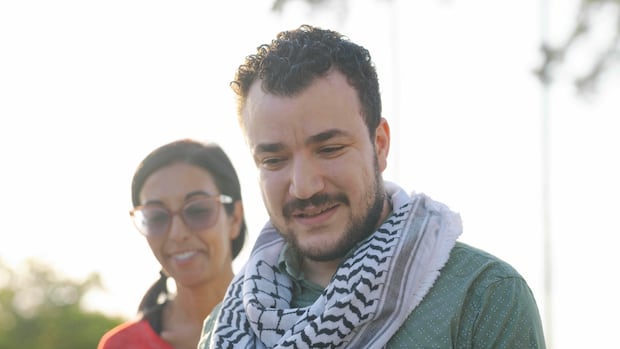Palestinian activist Mahmoud Khalil was released on Friday from federal immigration detention, freed after three months by a judge’s ruling after becoming a symbol of U.S. President Donald Trump ‘s clampdown on campus protests.
The former Columbia University graduate student left a federal facility in Louisiana on Friday. He is expected to head to New York to reunite with his U.S. citizen wife and newborn son.
The Trump administration sought to deport him over his role in pro-Palestinian protests.
“Justice prevailed, but it’s very long overdue,” he said outside the facility in a remote part of Louisiana. “This shouldn’t have taken three months.”
Khalil was released after U.S. District Judge Michael Farbiarz said it would be “highly, highly unusual” for the government to continue detaining a legal U.S. resident who was unlikely to flee and hadn’t been accused of any violence.

“Petitioner is not a flight risk and the evidence presented is that he is not a danger to the community,” he said. “Period, full stop.”
Later in the hour-long hearing, which took place by phone, the judge said the government had “clearly not met” the standards for detention.
The government filed notice on Friday evening that it’s appealing Khalil’s release.
Khalil had to surrender his passport and can’t travel internationally, but he will get his green card back and be given official documents permitting limited travel within the country, including New York and Michigan to visit family, New Jersey and Louisiana for court appearances and Washington to lobby Congress.

Khalil was the first person arrested under Trump ‘s crackdown on students who joined campus protests against Israel’s devastating war in Gaza. U.S. Secretary of State Marco Rubio has said Khalil must be expelled from the country because his continued presence could harm American foreign policy.
The judge had ruled earlier that the government couldn’t deport Khalil on those grounds but gave it leeway to continue pursuing a potential deportation based on allegations that he lied on his green card application. Trump administration lawyers repeated that accusation at Friday’s court hearing — an allegation Khalil disputes.
In issuing his ruling on Friday, Farbiarz agreed with Khalil’s lawyers that the protest leader was being prevented from exercising his free speech and due process rights despite no obvious reason for his continued detention. The judge noted that Khalil is now clearly a public figure.
Angus Johnston, a student activism historian at the City University of New York, says the ‘radical activist tactics’ in the anti-Vietnam War protests in the late 1960s are not present in the pro-Palestinian student movement today.
Khalil’s lawyers had asked that he either be freed on bail or, at the very least, moved from Louisiana to New Jersey so he can be closer to his wife and newborn son, who are both U.S. citizens.
Khalil’s wife, Dr. Noor Abdalla, said she can finally “breathe a sigh of relief” after her husband’s three months in detention.
“We know this ruling does not begin to address the injustices the Trump administration has brought upon our family, and so many others,” she said in a statement provided by Khalil’s lawyers. “But today we are celebrating Mahmoud coming back to New York to be reunited with our little family.”
The judge’s decision comes after several other scholars targeted for their activism have been released from custody, including another former Palestinian student at Columbia, Mohsen Mahdawi; a Tufts University student, Rumeysa Ozturk; and a Georgetown University scholar, Badar Khan Suri.
Khalil was detained on March 8 at his apartment building in Manhattan over his participation in pro-Palestinian demonstrations.
The international affairs graduate student isn’t accused of breaking any laws during the protests at Columbia. He served as a negotiator and spokesperson for student activists and wasn’t among the demonstrators arrested, but his prominence in news coverage and willingness to speak publicly made him a target of critics.
The Trump administration has argued that non-citizens who participate in such demonstrations should be expelled from the country, as it considers their views antisemitic.

